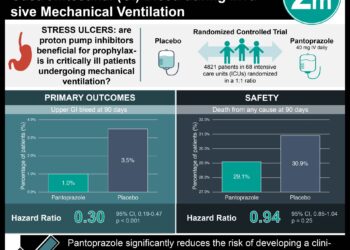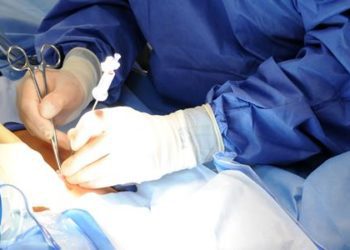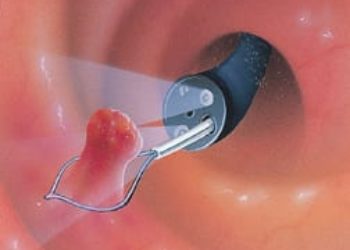Embolization effective for treatment of upper GI bleeding in unstable patients
1. Among hemodynamically unstable patients with nonvariceal upper gastrointestinal tract bleeding, transcatheter arterial embolization using n-butyl cyanoacrylate (NBCA) was shown to be a safe and technically-feasible treatment strategy.
2. Major predictors of recurrent bleeding after embolization included a history of hematologic malignancy, underlying coagulopathy, steroid exposure, and an inability to directly introduce NBCA into the area of bleeding.
Evidence Rating: 3 (Good)
Study rundown: Upper gastrointestinal tract bleeding (UGIB) is a very common diagnosis among patients admitted to the hospital, and management typically involves procedures that identify and treat the source of bleeding. One method, transcatheter arterial embolization (TAE), involves the use of catheters placed within arteries to introduce chemicals that stop blood flow at the site of bleeding. Several TAE strategies currently exist, but to date none has been shown to superior in the management of UGIB not caused by varices. N-butyl cyanoacrylate (NBCA) is one attractive option in that it theoretically does not rely on the body’s coagulation machinery to achieve hemostasis, and its liquid-physical properties allow it to extend into smaller vessels when compared to other embolization agents.
This study aimed at evaluating the safety and effectiveness of NBCA in among hemodynamically-unstable patients with nonvariceal UGIB, a group at high risk for rebleeding after embolization. Researchers used hospital records over a four year period within a single academic center to identify a series of patients that underwent NBCA embolization for UGIB. Results suggested a high rate of technical and clinical success (defined in terms of successful hemostasis and prevention of rebleeding events, respectively), and the incidence of major complications was low. Furthermore, several patient factors were found to be predictors of recurrent UGIB, including a history of hematologic cancer. This study’s primary limitations were the lack of a control group, the retrospective, single-center methodology, and the limited provided information regarding operator characteristics. Follow-up studies should attempt to prospectively investigate the clinical outcomes of NBCA versus similar embolization materials at a multicenter level in a larger patient population.
Click to read the study in Journal of Vascular and Interventional Radiology
Relevant Reading: Safety and efficacy of transcatheter arterial embolization for lower gastroinstestinal bleeding: a single-center experience with 112 patients (JVIR)
In-Depth [retrospective cohort]: This study retrospectively reviewed 382 cases of emergent angiography performed in patients with nonvariceal UGIB, of which 49 underwent TAE with NBCA. All included patients were hemodynamically unstable, defined by a systolic blood pressure of less than 90 and one or more blood transfusions within 24 hours of the procedure. Of these 49 cases, 98% were technically successful (hemostasis achieved by TAE), and 71% were clinically successful (lack of residual bleeding at seven days post-procedure). Late rebleeding episodes were common, with a total of 39% of patients experiencing any bleeding from the upper gastrointestinal tract within 30 days, and 6% had a need for surgery post-procedure. The major complication rate was 2%; one patient experienced liver injury as evidenced by a transient elevation on liver enzymes. The 30-day all-cause mortality rate for TAE was 31% in this high-risk group. Significant predictors of recurrent UGIB included hematologic malignancy (P = 0.017), coagulation deficits (P = 0.003), recent steroid treatment (P=0.025), and failure to introduce NBCA directly into the culprit lesion (P=0.003).
Image: PD
©2012-2014 2minutemedicine.com. All rights reserved. No works may be reproduced without expressed written consent from 2minutemedicine.com. Disclaimer: We present factual information directly from peer reviewed medical journals. No post should be construed as medical advice and is not intended as such by the authors, editors, staff or by 2minutemedicine.com. PLEASE SEE A HEALTHCARE PROVIDER IN YOUR AREA IF YOU SEEK MEDICAL ADVICE OF ANY SORT.







